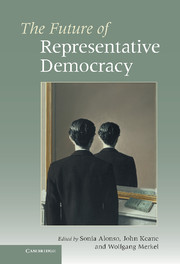Book contents
- Frontmatter
- Contents
- List of figures
- List of tables
- Notes on contributors
- Acknowledgements
- Editors' introduction: Rethinking the future of representative democracy
- 1 Representative democracy and its critics
- 2 Representative democracy and the populist temptation
- 3 The wider canvas: representation and democracy in state and society
- 4 Performance and deficits of present-day representation
- 5 Do parliaments have a future?
- 6 Engendering representative democracy
- 7 Representative democracy and the multinational demos
- 8 Diagnosing and designing democracy in Europe
- 9 Monitory democracy?
- 10 Representing nature
- 11 Democracy and representation beyond the nation state
- General bibliography
- Index
- References
11 - Democracy and representation beyond the nation state
Published online by Cambridge University Press: 05 June 2012
- Frontmatter
- Contents
- List of figures
- List of tables
- Notes on contributors
- Acknowledgements
- Editors' introduction: Rethinking the future of representative democracy
- 1 Representative democracy and its critics
- 2 Representative democracy and the populist temptation
- 3 The wider canvas: representation and democracy in state and society
- 4 Performance and deficits of present-day representation
- 5 Do parliaments have a future?
- 6 Engendering representative democracy
- 7 Representative democracy and the multinational demos
- 8 Diagnosing and designing democracy in Europe
- 9 Monitory democracy?
- 10 Representing nature
- 11 Democracy and representation beyond the nation state
- General bibliography
- Index
- References
Summary
Introduction
If the EU were to apply for membership of the EU, it would not qualify because of the inadequate democratic content of its constitution. At the same time, a significant proportion of legislative activity in its member states is driven by decisions made in the opaque labyrinth of institutions in far-away Brussels. So, are the member states democratically governed?
The picture is similar with respect to other international institutions in the OECD world. The WTO system of agreements, for instance, comprises almost 10,000 pages and is the result of marathon negotiations, lasting over a decade, involving over 150 states and thousands of experts. These agreements contain far-reaching implications for employees in crisis-prone industrial sectors, and in agriculture. To be sure, it was the democratically elected governments that participated in the negotiations. But did citizens really exercise recognisable influence over the decisions?
The problem behind these questions is clear. Although security and social welfare, two central aims of governance, can be better achieved with international institutions than without them, the mere existence of international institutions is no guarantee of good governance. Moreover, international institutions now truly exercise power. The rise of dispute settlement bodies, majority decisions rules, improved monitoring schemes, the role of transnational groups in ‘enforcing’ rules via naming and shaming, and, of course, a body of ius cogens in international law has led to an undermining of the consensus principle of international politics (Zürn et al. 2007).
- Type
- Chapter
- Information
- The Future of Representative Democracy , pp. 258 - 281Publisher: Cambridge University PressPrint publication year: 2011
References
- 12
- Cited by



